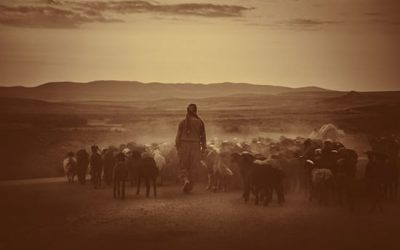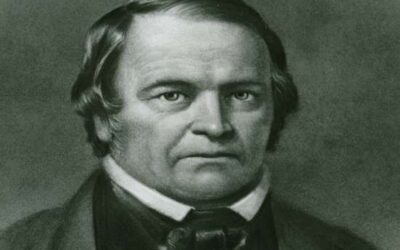The Bible is full of beautiful promises that can comfort us in a variety of situations. They can give us hope when we are hopeless, make us feel grateful for God’s love, and comfort us when we’re grieving or suffering.
God’s Word is especially useful for times of worry, or when you have an anxious heart. And there are so many Bible verses in Scripture that talk about exactly that! It’s one of the most significant side effects of sin.
So if you’ve ever felt fearful about the future, your health (or that of a loved one), making a difficult decision…and the endless list of things that can cause us to worry, we’ll highlight some promises in the Bible that can assure you of our Heavenly Father’s care and protection, no matter the circumstances.
Specifically, we’ll talk about promises for when these 7 common circumstances cause us to worry:
- Basic necessities, like food and clothing
- The future
- Health for yourself or a loved one
- Safety
- Suffering
- Facing a difficult task or decision
- Guilt and shame
Let’s explore the Word of God together and discover how to depend on the Lord for all our worries.
1.Basic necessities
Paul says that “God shall supply all your need[s] according to His riches in glory by Christ Jesus” (Philippians 4:19, NKJV).
And to demonstrate this, Jesus pointed us to observe how He takes care of His creation.
In His famous Sermon on the Mount, Jesus spends a significant amount of time talking about not worrying. He highlights a few necessities specifically: food and clothing.
Let’s look at promises about both of these basic needs.
Having enough to eat
Concerning food, He pointed us to God’s care for birds, saying:
“Look at the birds of the air, for they neither sow nor reap nor gather into barns; yet your heavenly Father feeds them. Are you not of more value than they?” (Matthew 6:26, NKJV).
He concluded by asking a very sobering question:
“And which of you by being anxious can add a single hour to his span of life?” (Matthew 6:27, ESV).
You and I know the answer, right?
Instead of worrying, we’d be much better off trusting God.
Having clothes to cover us

Photo by Sarah Brown on Unsplash
About clothing, Jesus Himself asked, “So why do you worry about clothing?” (Matthew 6: 28, NKJV).
And to show us why we don’t need to worry about this, He pointed us to His care for flowers, saying:
“Consider the lilies of the field, how they grow: they neither toil nor spin; and yet I say to you that even Solomon in all his glory was not arrayed like one of these.
Now if God so clothes the grass of the field, which today is, and tomorrow is thrown into the oven, will He not much more clothe you, O you of little faith?” (Matthew 6:28-30, NKJV).
He asks us not to worry “saying, ‘What shall we eat?’ or ‘What shall we drink?’ or ‘What shall we wear?’” (Matthew 6:31, NKJV).
In fact, He takes it deeper when He says: “Do not be anxious about your life, what you will eat or what will drink, nor about your body, what you will put on” (Matthew 6:25, ESV).
He then puts our worries into proper perspective when He asks, “Isn’t life more than food and the body more than clothing?” (Luke 12:30, ESV).
He says that you don’t have to worry because “your Father knows that you need them” (Matthew 6:32, NKJV).
But He tells us what our one priority should be. The one thing that He is looking for in us in order to supply all our needs. He says:
“But seek first the kingdom of God and His righteousness, and all these things shall be added to you” (Matthew 6:33, NKJV).
When we do this, the peace of Christ will grow in our hearts.
2. When worried about the future
This is definitely a relatable worry. Most of us, at one point or another, have worried about the future and thought about all of the “what-ifs.” But, we can’t see the future, and we can’t control the future. Which ultimately makes this kind of worrying futile.
What does the Bible say?
Well, the Bible tells us again and again that when we depend on God, He will guide our futures.
In fact, Solomon, whom God gave the gift of wisdom to, reminds us:
“Trust in the Lord with all your heart, and do not lean on your own understanding. In all your ways acknowledge Him, and He will make straight your paths” (Proverbs 3:5-6, ESV).
If we trust in God instead of trying to control the future, we can feel confident that the Holy Spirit will guide us.
This topic comes up again when Jesus is preaching the Sermon on the Mount.
He saw our tendency to crowd our lives with thoughts of what the future will bring. So He told us:
“Therefore do not worry about tomorrow, for tomorrow will worry about its own things. Sufficient for the day is its own trouble” (Matthew 6:26-34, NKJV).
With God by our side, we can trust Him with the future and “be strong and courageous” no matter what (Joshua 1:6, ESV).
3. When worried about your health
Health is something we tend to take for granted when we have it, and sorely miss when we don’t.
God, Himself, gave specific laws to the children of Israel that had to do with everything about their lives. They even included practices which promoted a very healthy lifestyle.
But we live in a sinful world, and even if someone does everything they can to be healthy, they may still experience poor health or serious illness.
Yet, the Bible gives us hope both for this life and the life to come.
The Psalmist also wrote that God will deliver the righteous “from the perilous pestilence (disease).” That no “plague (diseases) [shall] come near your dwelling.” And He will satisfy you “with long life” (Psalm 91:3,10; Psalm 91:16, NKJV).
God also promises to carry our burdens for us, which can give us mental strength during times of illness:
“Cast your burden on the Lord, and He will sustain you” (Psalm 55:22, ESV).
4. When worried about your safety
 To show just how much Jesus watches to ensure we are kept safe, He pointed to God’s watch-care for sparrows.
To show just how much Jesus watches to ensure we are kept safe, He pointed to God’s watch-care for sparrows.
“Are not two sparrows sold for a penny? And not one of them will fall to the ground apart from your Father. But even the hairs of your head are all numbered. Fear not, therefore; you are of more value than many sparrows” (Matthew 10:29-31, ESV).
In Psalm 91, God also promises to be your shield and buckler. To be your refuge and fortress. That “He shall give His angels charge over you, to keep you in all your ways” (Psalm 91:11, NKJV).
And even though “a thousand may fall at your side, and ten thousand at your right hand,” He will not allow evil to “come near you” (Psalm 91:7, NKJV).
Another one of the Psalms, Psalm 23, also expresses how God will protect us:
“Even though I walk through the valley of the shadow of death, I will fear no evil, for you are with me” (Psalm 23:4, ESV).
In Psalm 27, 56, 46, 94, and 121, we are reassured that even if we do face danger, humans cannot take away our eternal salvation:
“The Lord is my light and my salvation; whom shall I fear? The Lord is the stronghold of my life; of whom shall I be afraid? (Psalm 27:1, ESV).
“In God, whose word I praise, in God I trust; I shall not be afraid. What can flesh do to me?” (Psalm 56:4, ESV).
“God is our refuge and strength, a very present help in trouble. Therefore we will not fear though the earth gives way, though the mountains be moved into the heart of the sea, though its waters roar and foam, though the mountains tremble at its swelling” (Psalm 46:1-3, ESV).
“When I thought, ‘my foot slips,’ Your steadfast love, O Lord, held me up. When the cares of my heart are many, Your consolations cheer my soul” (Psalm 94:18-19, ESV).
“The Lord will keep your going out and your coming in from this time forth and forevermore” (Psalm 121:8, ESV).
So, every time you start worrying about your safety, turn to the book of Psalms!
You’ll find very precious promises of God’s watch and care for the righteous.
5. When you’re afraid of suffering or pain
As human beings in a sinful world, we are bound to experience suffering or see someone we love suffer.
And it hurts. It just hurts.
And seeing that this could be one more thing that can worry us as we anticipate it, Jesus left us a promise for it, too. He said:
“I have told you these things so that in Me you may have peace. You will have suffering in this world. Be courageous! I have conquered the world” (John 16:33, CSB).
The apostle Paul took this promise seriously, and it worked for him.
In his suffering, he prayed to God and asked Him to remove it. God’s response to him was, “My grace is sufficient for you, for My strength is made perfect in weakness” (2 Corinthians 12:9-10, NKJV).
So, with God’s help, he dealt with his anxieties about his difficult situation until he could say:
“Therefore most gladly I will rather boast in my infirmities, that the power of Christ may rest upon me. Therefore I take pleasure in infirmities, in reproaches, in needs, in persecutions, in distresses, for Christ’s sake. For when I am weak, then I am strong” (2 Corinthians 12:9-10, NKJV).
And through prayer and trust in God, you, too, can have such strength even in the hardest situations.
6. When faced with a difficult task or decision

Photo by Helena Lopes on Unsplash
At times, we are faced with big decisions—times when there’s so much at stake that we fear making the wrong decision, or not choosing the best option.
This could be a decision on a business deal. One that either means big profits for your company or bankruptcy.
Or you may be required to take on a responsibility that you feel unprepared for. Like becoming a new parent. Or taking on a demanding job, or having to care for a disabled spouse after an accident, or deciding whether or not to let your teenager do a/b/c/d…
In times like these, God says:
Do not fear, for I am with you; do not be afraid, for I am your God. I will strengthen you; I will help you; I will hold on to you with My righteous right hand (Isaiah 41:10, CSB).
And this is not the only place that God tells us not to fear.
Depending on what Bible translation you use, there are so many times in the Bible when God tells us “Do not fear” or “Do not be afraid.”
This tells you that there’s no need to fear because God’s got your back!
In Psalm 34, David writes that God delivered him from his fears, and He will do the same for you if you trust Him completely.
7. When harassed by guilt and shame
You may be worried that God will not accept you because of your past. Or maybe you worry that your past will make you unacceptable to anyone else you befriend.
Maybe you have gone through all these promises in this post, and thought they don’t apply to you because of things you have done. It could be you’ve made mistakes that you have regrets about.
Whether only you know about them or the whole world knows about it, know that God knows, too. And the good news is that He doesn’t want you to keep worrying over whether or not He accepts you.
All He wants you to do is come to Him as you are, confessing your sin to Him in repentance. A good example of such repentance is found in Psalm 51.
And His promise to you is:
“I, even I, am the one who wipes out your transgressions for My own sake; And I will not remember your sins” (Isaiah 43:25, NASB).
And whenever you find yourself doubting His forgiveness and acceptance, hear Him saying to you:
“Let not your heart be troubled; you believe in God, believe also in Me” (John 14:1, NKJV).
Believe Him when He tells you that all these promises can be yours, too, if you trust Him. Trust Him as the one who has your best interest at heart. The one who has you under His constant watch care because you are His.
The peace of God can be in your heart:
“And let the peace of Christ rule in your heart” (Colossians 3:15, ESV).
He is the one who tells you, “Fear not, for I have redeemed you; I have called you by your name; You are Mine” (Isaiah 43:1, NKJV).
And as you go on to live your life fearless and worry free, always remember Jesus Christ sends you out each day saying:
“Peace I leave with you. My peace I give to you. I do not give to you as the world gives. Don’t let your heart be troubled or fearful” (John 14:27, CSB).
Use some of these verses and claim the promises of God in your next devotional time and find peace and rest for your soul.
Want to learn more about how you can have peace in your life through Jesus? Read this page next: 12 practical ways to overcome fear and worry!
Choose an Online Bible Study
Want to keep learning? Find out more about Jesus, humanity, the plan of salvation, and how God loves you enough to sacrifice everything, just to give you a chance to choose Him.
Sometimes it can be hard to know where to start, that’s why we offer free, user-friendly, online Bible study options you can do anytime, anywhere, and at your own pace.
This online Bible school will take you through the major themes of Scripture, breaking down the Bible’s complex concepts into bite-sized pieces, which can lead you toward the answers of life’s more challenging questions.
More Answers
All about Adventist Elementary Schools
The Seventh-day Adventist Church operates the largest Protestant education system in the world. A big part of this system is our K-8 elementary schools, or primary schools, as they’re known in other parts of the world.
What Are Pathfinder and Adventurer Clubs?
Like the boy or girl scouts, Pathfinders and Adventurers learn about nature and life skills. But what makes these clubs special is their purpose to bring young people closer to Jesus.
13th Sabbath Offering: What It Is and Why It Matters
While the previous 12 Sabbaths of the quarter feature an established Adventist ministry and its current giving needs, the 13th is a rotating spot reserved for current mission projects.
A Look at Adventist Colleges and Universities
On the outside, Seventh-day Adventist universities may not look much different than other college campuses. But the real differences are beneath the surface.
What Is ASI (Adventist-Laymen’s Services and Industries)?
ASI, which stands for Adventist-laymen’s Services and Industries, is a membership-based organization that provides support for Seventh-day Adventist laypeople (Adventist professionals who aren’t pastors).
What Are Adventist Evangelistic Meetings?
The Seventh-day Adventist Church puts a huge emphasis on sharing the gospel through evangelism, or sharing the gospel through preaching, teaching, and testimony. One of the ways we accomplish this is by organizing public events called evangelistic meetings.
Rest and Reconnection: What It Really Means to Keep the Sabbath
The Bible tells us that we keep the Sabbath by avoiding work. God made this law because he knew it would strengthen us and bring us joy, as well as give us time to reconnect with Him and recharge from our busy lives.
The Parables of Jesus: What They Teach Us About Life
Have you ever been on the verge of sleep in the middle of a long lecture or sermon when suddenly the speaker takes a turn and begins to tell a story?
The Story of Moses in the Bible: What His Life Teaches Us
A baby on death row, an outcast prince, a humble shepherd, and an unlikely deliverer. All these titles describe the individual that led Israel out of slavery in Egypt to the borders of the Promised Land.
Christian Summer Camps—A Cherished Adventist Ministry
School’s out, the sun’s shining, and your kids are thrilled to have the summer ahead of them. Then three days in, you hear, “I’m bored…”
Who was J.N. Andrews and How Did He Contribute to Adventism?
John Nevins Andrews (1829–1883) was an influential leader in the early days of the Seventh-day Adventist Church. He was a Bible scholar who helped shape several Adventist beliefs and juggled many roles in the Church. Most notably, he was the first official missionary for the Adventist Church outside North America.
The 42 Kings (and 1 Queen) of Israel and Judah in the Bible
Conspiracies, royal scandals, dictatorships—history is full of them. And Bible history is no different when we stop to look at the kings of ancient Israel in the Old Testament.
Do Adventists Have Their Own Bible?
Adventists have some unique beliefs—you might be able to name some of them right now. The seventh-day Sabbath. Death as a sleep. Hell as nonexistence.
What Is Vespers?
Friday rolls around, and you’re spending time with your Adventist friends or relatives when they mention they’re going to vespers tonight.
The Creation of the World: What the Bible Really Says
When we think about the biblical Creation story, we think of just that: the world being created by the Creator. And while God’s creation of the world is marvelous and miraculous in its own right, it’s about far more than the sudden appearance of plants, animals, and humans.
What’s the History of the Bible?
The Bible is the number one bestseller in the world of all time.1 It’s translated into thousands of languages, read by people of all ages and backgrounds.
Adventist Pastors
What is the role of a pastor in the Adventist Church? The position itself, at least as far as a local congregation is concerned, is not much different from that of pastors in other protestant denominations.
The Leadership Structure of the Seventh-day Adventist Church
The Seventh-day Adventist Church has a representative form of structure that connects its 90,000-plus congregations across the globe and gives its members a part in decision-making. Though the Church was incorporated in 1863, this system came about during the church’s reorganization from 1901 to 1903. It includes four levels of organization.
What Does “Adventist” Mean
Seventh-day Adventists are a Protestant Christian denomination who hold to the biblical seventh-day Sabbath. From this belief, they get the first part of their name.
Who Were the Israelites in the Bible?
The Israelites in the Bible, also known as the children of Israel or ancient Israel, were a nation God called to represent Him to the world. As recorded in the book of Exodus, He delivered them from slavery in Egypt under Moses’s leadership and brought them to the Promised Land of Canaan (located in a similar area to present-day Israel).
Everything You Need to Know About Sabbath Meals
For Seventh-day Adventists, sharing a Sabbath meal with friends and family is one of the most special and memorable parts of the Sabbath.
William Miller
William Miller was a farmer who began a nationwide religious movement surrounding the Second Coming of Jesus. Learn about the life and legacy of this Christian pioneer.
What We Can Learn from the Life of Joshua
Joshua was an iconic leader in the Old Testament of the Bible. As a successor to Moses, he was both a humble servant of God and a strong warrior. God called Him to lead the nation of Israel to take possession of Canaan, the Promised Land—a task he took on with faith and courage.
Why is Abraham Important in the Bible?
God communicated directly with Abraham and made a covenant with him that would provide land, protection, and fruitfulness for his descendants. And he indeed became the father of many nations, making him a foundational figure in three monotheistic world religions: Judaism, Islam, and Christianity (Genesis 17:5, 19-20; Genesis 25:1-6, 12-18).
Didn’t find your answer? Ask us!
We understand your concern of having questions but not knowing who to ask—we’ve felt it ourselves. When you’re ready to learn more about Adventists, send us a question! We know a thing or two about Adventists.






























